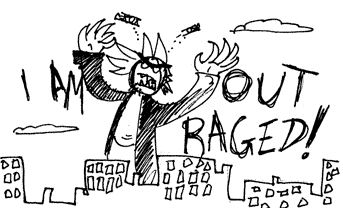COMMENT: Time for outrage!
The day I picked up a copy of Stéphane Hessel’s Time for Outrage! at my local bookstore was the day the Royal Bank of Canada’s hiring practices made headlines. There was confusion about what RBC was being accused of. Was it outsourcing? Was it off-shoring? Was it an abuse of the temporary foreign workers’ program? Whatever it was, or is, and as much concern and protest the federal government may express, I do believe that RBC plays by and fully complies with government rules.
As I listened to a multitude of economists, political scientists and other experts being interviewed on radio, debating and discussing what the story was all about, I found the most befitting explanation in Hessel’s Time for Outrage. It is the smallest book in my home library; just 40 pages including foreword and end notes. Stéphane Frédéric Hessel was 93 years old when he wrote this, his last book. He died a few months ago at the age of 95. The story of his life would fill volumes. He became a member of the French Resistance in Britain, parachuted into France before the invasion to organize resistance fighters, and was captured and sent to a concentration camp where he was tortured before he escaped. After the war Hessel became a diplomat and was involved, with Eleanor Roosevelt, in drafting the United Nations Universal Declaration of Human Rights.
Hessel recalls how economic policies had produced mass unemployment and fascism, ending in a ruinous war. It was only then that European countries adopted the economic policy principles called for by the French Resistance. Namely, “A comprehensive Social Security plan, to guarantee all citizens a means of livelihood in every case where they are unable to get it by working”; and “retirement benefit that allows older workers to end their lives with dignity.” Hessel’s call for outrage was inspired by his early experience as a member of the French Resistance: “They have the nerve to tell us that the state can no longer cover the costs of these social programmes. Yet how can the money to continue and extend these achievements be lacking today, when the creation of wealth has grown so enormously since the Liberation, a time when Europe lay in ruins?”
In a few short paragraphs Hessel cut through much of the nonsense citizens are served up by their governments today. We have been conditioned to accept it as normal that bank profits are measured in the billions of dollars. How much is one billion dollars anyway? It is one thousand million dollars! Put another way, one billion dollars represents the annual wage of 49,000 citizens working a 40-hour week at minimum wage. RBC’s profits reached 7.5 billion dollars in 2012, which is what 367,500 citizens working at minimum wage for a full year earn. And that represents the profits of just one bank.
Citizens are told that bank profits are good for the country, and that dividends derived from these profits flow to our pension plans. Yes indeed, a share of profits does. But if these profits were taxed at a higher rate they would help pay for the many public services which governments now tell us are no longer affordable. If banks paid higher wages – not just higher executive salaries and bonuses – but higher wages to clerks, tellers, and janitors, the additional money paid to these employees would flow back into the economy to benefit society as a whole.
The shelf space occupied by my books on and relating to politics and economics measures 30 feet, but every book I add to my library raises new questions. How can I reasonably explain our economic and political quagmire in a column limited to 630 words? Stéphane Hessel answered my question in three words: Time for Outrage!
Andre Carrel is a retired City Administrator, journalist, author, and full-time grandpal.
























Comments